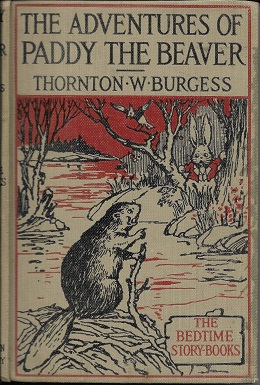Paddy

One in a series of posts dedicated to pop-culture depictions of beavers — as symbolic representations of Americans — from 1904–2003. The series derives its title from Thomas Carlyle’s warning about merely instinctive labor.
The Adventures of Paddy Beaver is a 1917 children’s book by the Massachusetts-based author Thornton Waldo Burgess. In 1914, the prolific Burgess published Jack Frost Helps Paddy the Beaver, but this sequel became more famous.
Paddy’s theme song is: “Work, work all the night / While the stars are shining bright; / Work, work all the day; / I have got no time to play.” You get the idea; this is propaganda aimed at children.
Now [Paddy] was ready to go to work, and when Paddy begins work, he sticks to it until it is finished. He says that is the only way to succeed, and you know and I know that he is right. … And as he worked, Paddy was happy, for one can never be truly happy who does no work.
Burgess has the following to say about Paddy’s usage of natural resources:
Now Paddy the Beaver loves the Green Forest as dearly as you and I do, and perhaps even a little more dearly. You see, it is his home. Besides, Paddy never is wasteful. So he cuts down a tree so that he can get all the bark instead of killing a whole lot of trees for a very little bark, as he might do if he were lazy. There isn’t a lazy bone in him — not one.
Following in the footsteps of Enos Abijah Mills, Burgess economically conflates a moral lesson about the necessity of conservation with one about the value of hard work.

